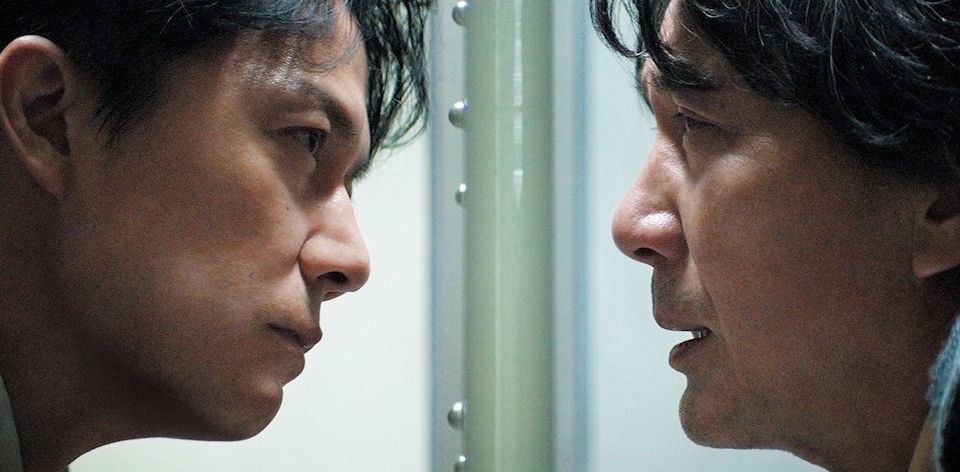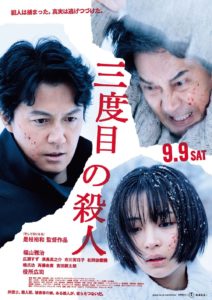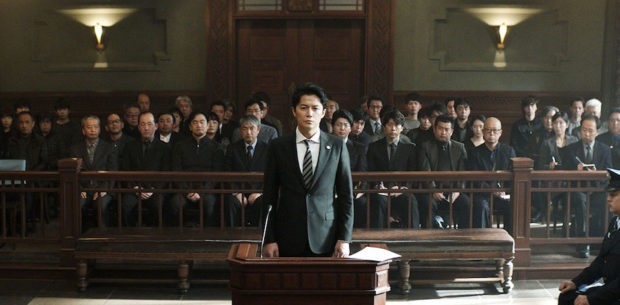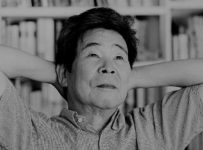Hirokazu Kore-eda opens THE THIRD MURDER (三度目の殺人), his twelfth narrative feature, with a murder and a body being burned. The darkly moody and stylised opening is a stark contrast not only with the intimate family portraits of the last few decades, but also with the precise confines of the legal thriller that follows.
Tomoaki Shigemori (Masaharu Fukuyama) is a lawyer who is tasked with defending Misumi (Kōji Yakusho), the man we saw commit violence in the aforementioned scene. If he is found guilty, he will be sentenced to death. Complicating matters are Misumi’s two previous convictions for murder, and his confession to this one. Yet Shigemori doubts that he is seeing the whole picture, and as the truth is revealed, stories change as rapidly as the definition of ‘truth.’
If Kore-eda’s previous films have earned him a (not unreasonable) comparison with Yasujiro Ozu, then the more obvious classic reference here would be more along the lines of Akira Kurosawa’s Rashomon. “We must object to the facts,” is Shigemori’s strategy from the start, and the film is structured to play with differing versions of the truth and which of these is closest to a subjective notion of justice.
As Shigemori digs into the case, we learn more about the relationship between the victim, his wife, and their dauhter Sakie (Suzu Hirose). Here THE THIRD MURDER is unquestionably on similar thematic ground as Kore-eda’s previous works, although the subtext is spoken aloud more than once: “For how long do the children have to pay for the crimes of the parents?” As Misumi changes his story, we start to doubt what we know, despite all evidence to the contrary, which does at least keep us guessing right up until the end.
With tightly controlled scenes often taking place across glass in a prison cell, the casting was essential. A powerfully understated performance from the always terrific Kōji Yakusho (The Blood of Wolves, Oh Lucy!) is quite literally overlaid against Masaharu Fukuyama (Mirai) in a lingering finale. Hammering home his point about the thin blue line, Kore-eda has both of their faces reflected in the same glass.
It is a beautifully shot film in parts too. Reuniting with Like Father, Like Son and Our Little Sister photographer Mikiya Takimoto, much of the film can feel claustrophobic in its repeated jail cell and court room motifs. Yet there are also times when the camera gets to add some wonderful pillow moments, such as a widescreen shot of a train making its way through the pristine snow.
What are left with the idea that nobody is telling the truth, and a dangling question of who gets to decide that. While not the searing indictment of Japan’s legal system that Masayuki Suo’s I Just Didn’t Do It (2007) represented, it does hold a mirror up to institutionalised justice. If THE THIRD MURDER is the ‘least’ of Kore-eda’s works to date, it may only be because of its cold and hard representation of that system. This mystery may be more sterile than we were expecting, but we’d watch the hell out of Kore-eda’s Law & Order: Tokyo.
[stextbox id=”grey” bgcolor=”F2F2F2″ mleft=”5″ mright=”5″ image=”null”] 2017 | Japan | DIRECTOR: Hirokazu Kore-eda | WRITERS: Hirokazu Kore-eda | CAST: Masaharu Fukuyama, Suzu Hirose, Shinnosuke Mitsushima, Mikako Ichikawa | DISTRIBUTOR: Toho, GAGA Corporation, New York Asian Film Festival (US) | RUNNING TIME: 124 minutes | RELEASE DATE: 30 June 2018 (NYAFF)[/stextbox]
2017 | Japan | DIRECTOR: Hirokazu Kore-eda | WRITERS: Hirokazu Kore-eda | CAST: Masaharu Fukuyama, Suzu Hirose, Shinnosuke Mitsushima, Mikako Ichikawa | DISTRIBUTOR: Toho, GAGA Corporation, New York Asian Film Festival (US) | RUNNING TIME: 124 minutes | RELEASE DATE: 30 June 2018 (NYAFF)[/stextbox]






